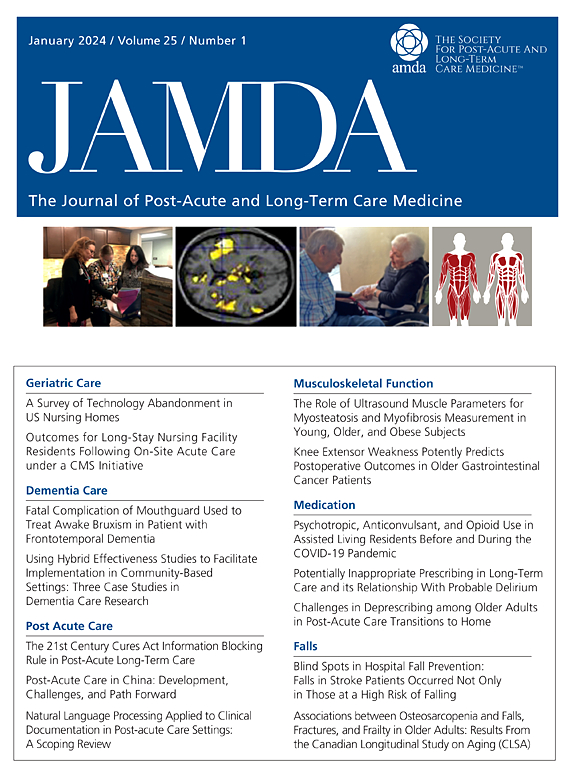Trajectories After In-Hospital Delirium: Long-Term Changes in Frailty and Cognition After COVID-19
IF 4.2
2区 医学
Q2 GERIATRICS & GERONTOLOGY
Journal of the American Medical Directors Association
Pub Date : 2025-07-11
DOI:10.1016/j.jamda.2025.105591
引用次数: 0
Abstract
Objectives
Delirium is a common complication in older patients hospitalized with COVID-19 and is associated with short-term functional and cognitive decline. This study evaluated whether in-hospital delirium is associated with long-term mortality and changes in frailty and cognition.
Design
This study is part of 2 retrospective and prospective Dutch multicenter cohort studies: the COVID-OLD and the CliniCo study.
Setting and Participants
Patients aged ≥70 years who survived hospitalization for COVID-19 were included in this study. Patients were hospitalized during the first (March-May 2020) and second wave (September 2020-December 2020) of the COVID-19 pandemic. Follow-up data were collected by phone approximately 2 years after hospital discharge.
Methods
In-hospital delirium was assessed using the Delirium Observation Screening Scale. Multivariable linear regression models were used to investigate the association between in-hospital delirium, and change in Clinical Frailty Scale, and change in cognition (Informant Questionnaire on Cognitive Decline in Elderly). Multivariable logistic regression models were used to investigate the association between in-hospital delirium and mortality at follow-up.
Results
At hospital discharge, 1663 patients were alive. Of those patients, 272 died before follow-up, 955 did not participate in the follow-up, and 436 patients participated in the follow-up. Of the follow-up cohort (median age, 75 years; interquartile range, 73-80; 65.4% men), 14.2% had in-hospital delirium. Delirium was not associated with long-term changes in Clinical Frailty Scale (β = 0.36; 95% CI, −0.11 to 0.82) or with mortality (OR, 1.29; 95% CI, 0.80-2.08). Patients with delirium more frequently suffered from long-term cognitive decline than patients without delirium (β = 2.45; 95% CI, 1.19-3.71).
Conclusions and Implications
Delirium was associated with long-term cognitive decline, but not with increased levels of frailty or mortality at follow-up. Follow-up consultations especially after delirium might be needed to assess possible cognitive decline.
院内谵妄后的轨迹:COVID-19后虚弱和认知的长期变化
目的:谵妄是老年COVID-19住院患者的常见并发症,与短期功能和认知能力下降有关。本研究评估住院谵妄是否与长期死亡率、虚弱和认知的改变有关。设计:本研究是两项回顾性和前瞻性荷兰多中心队列研究的一部分:COVID-OLD和CliniCo研究。环境和参与者:年龄≥70岁且因COVID-19住院后存活的患者纳入本研究。患者在2019冠状病毒病大流行的第一波(2020年3月至5月)和第二波(2020年9月至12月)期间住院。出院后约2年通过电话收集随访数据。方法:采用谵妄观察筛选量表对院内谵妄进行评估。采用多变量线性回归模型探讨住院谵妄与临床虚弱量表变化、认知变化(老年人认知能力下降问卷)的关系。采用多变量logistic回归模型探讨住院谵妄与随访死亡率之间的关系。结果:出院时患者存活1663例。其中272例患者在随访前死亡,955例患者未参加随访,436例患者参加了随访。随访队列(中位年龄75岁;四分位数范围为73-80;65.4%男性),14.2%有院内谵妄。谵妄与临床虚弱量表的长期变化无关(B = 0.36;95% CI, -0.11 ~ 0.82)或与死亡率(or, 1.29;95% ci, 0.80-2.08)。谵妄患者比非谵妄患者更容易出现长期认知能力下降(B = 2.45;95% ci, 1.19-3.71)。结论和意义:谵妄与长期认知能力下降有关,但与随访时虚弱程度或死亡率的增加无关。随访咨询,特别是谵妄后可能需要评估可能的认知能力下降。
本文章由计算机程序翻译,如有差异,请以英文原文为准。
求助全文
约1分钟内获得全文
求助全文
来源期刊
CiteScore
11.10
自引率
6.60%
发文量
472
审稿时长
44 days
期刊介绍:
JAMDA, the official journal of AMDA - The Society for Post-Acute and Long-Term Care Medicine, is a leading peer-reviewed publication that offers practical information and research geared towards healthcare professionals in the post-acute and long-term care fields. It is also a valuable resource for policy-makers, organizational leaders, educators, and advocates.
The journal provides essential information for various healthcare professionals such as medical directors, attending physicians, nurses, consultant pharmacists, geriatric psychiatrists, nurse practitioners, physician assistants, physical and occupational therapists, social workers, and others involved in providing, overseeing, and promoting quality

 求助内容:
求助内容: 应助结果提醒方式:
应助结果提醒方式:


